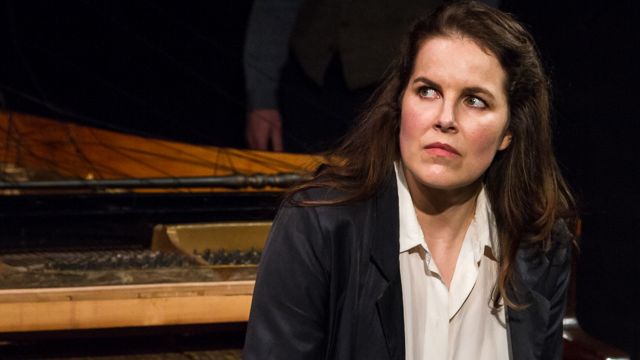Incognito
To create and present a cerebral, challenging and complex work such as Incognito is a risky enterprise. But Nick Payne’s play is, although demanding, visceral and moving – and realised here with great clarity and skill by the Red Stitch cast. It runs - or rather weaves together - five story strands of both ‘real’ and fictitious characters. The cast of only four create twenty-one characters – of different ages, nationalities and personalities - switching, gliding, transforming across pauses of seconds from one to the next and the next… and back again. This hugely difficult task is not imposed by budget or directorial ‘concept’; it is specified in the text. The play, as you might guess, requires intense audience attention, but it’s attention that is richly rewarded.
The play’s subject, to state it in reductive or simplistic terms, is the human brain and identity. That is, the human brain as the repository of emotion, rationality, memory, personality and ability – and, in the case of Albert Einstein, genius? Or is it ‘just’ a muscle located in the skull, the locus of electrical and chemical actions and reactions? Is a human being a mere ‘ghost in the machine’? One character, Martha, a clinical neuropsychologist (Kate Cole, who plays four other characters as well) remarks how she’s considered the brain – although she has only seen two actual, physical specimens - and, ‘There is nothing there…’

One of the ‘real’ characters is pathologist Thomas Harvey (Ben Prendergast, who also plays five other characters). Harvey conducted the autopsy on Einstein and literally stole his brain, later slicing it like a salami for the benefit of other researchers. As far as we know, nothing has ever come from this enterprise beyond the notoriety of Dr Harvey. What did Harvey expect to find? Dead Einstein’s was dead tissue. But then there’s an investigator who wants one of those brain slices to compare the DNA with that of a woman who could be Einstein’s biological daughter…
By contrast, there is Henry (Paul Ashcroft, who likewise plays five other characters) who suffered such acute memory loss (after an operation to cure his epilepsy) that he cannot not remember what has occurred as little as seven seconds previously. Henry is oblivious to his problem. The heartbreak comes for those who love him – such as his wife Margaret (Jing-Xuan Chan). She eventually gives up, but Henry can’t remember that she’s gone… Thirty years later, he’s still expecting her return and then they’ll go on their honeymoon… So, who is Henry?
The other seventeen characters – doctors, a lawyer, journalists, another memory loss patient – play out variations on these foundation questions, variations such misreading the persona or intentions of another, such as disguising reality by deliberately lying, such as the frustration of ‘helpers’ when the patient can’t be known (but who can?). One journalist (Mr Ashcroft again) sensationalises the theft of Einstein’s brain, but passes over the issue of why it was stolen and what – if anything – came of it.
The cast handles these transitions with what looks like ease (but who wants to see effort?): their concentration and control is wonderful. They are aided and guided by the joint directors, Ella Caldwell and Brett Cousins, who between them must have made a thousand decisions – and it must have been interesting to see them make them. One decision, it appears, was to rely on emotion and to mine the humour, and to omit the titling of different segments as demanded by Mr Payne. The result repays their efforts: there is a flow and a rightness to what we see on the stage.
 All this plays out under and around Chloe Greaves’ suggestive, metaphoric set: multiple wires criss-cross above the players like the synapses of a brain. More wires connect a grand piano (Henry is a musician, another poignant element) to its lid, suspended above. Bare light bulbs, scattered through the wire, light up like thoughts… and dim… and go out – in apparent random order. Tom Willis’ stage lighting nicely assists transitions from character to character, from story strand to story strand. Music and sound design is by THE SWEATS – subtle and unobtrusive, always at the service of the drama.
All this plays out under and around Chloe Greaves’ suggestive, metaphoric set: multiple wires criss-cross above the players like the synapses of a brain. More wires connect a grand piano (Henry is a musician, another poignant element) to its lid, suspended above. Bare light bulbs, scattered through the wire, light up like thoughts… and dim… and go out – in apparent random order. Tom Willis’ stage lighting nicely assists transitions from character to character, from story strand to story strand. Music and sound design is by THE SWEATS – subtle and unobtrusive, always at the service of the drama.
Nick Payne goes out on a limb with his text. It is not easy, but his subject is not easy. The play has met mixed receptions elsewhere. Here, we could, of course, be merely awed by the skill of the Red Stitch cast, but as we untie our knot of concentration at the end, we realise that our brains have been challenged and stimulated, and our emotions engaged.
Michael Brindley
Images: Teresa Noble Photography
Subscribe to our E-Newsletter, buy our latest print edition or find a Performing Arts book at Book Nook.

